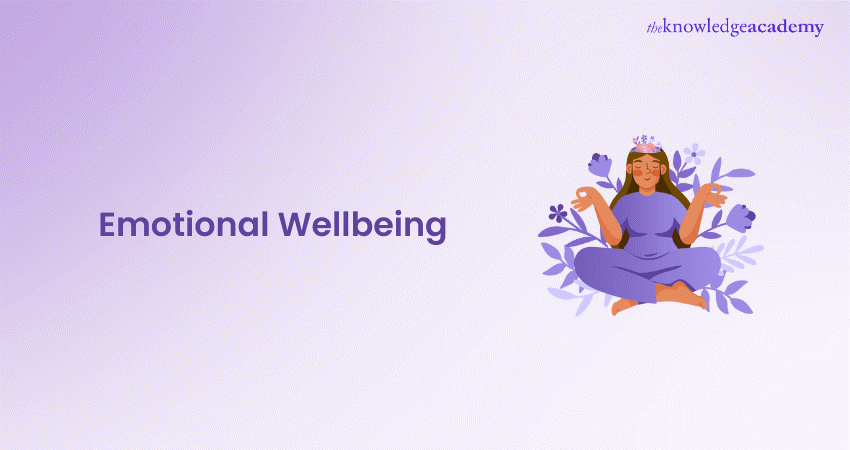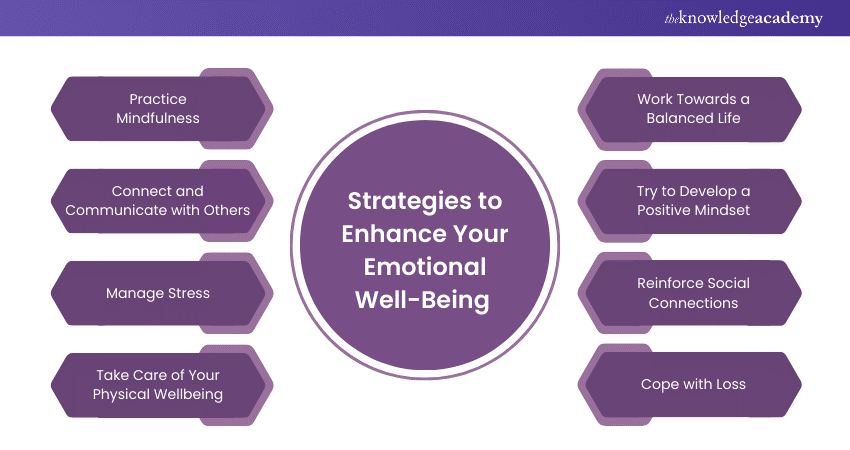We may not have the course you’re looking for. If you enquire or give us a call on +55 8000201623 and speak to our training experts, we may still be able to help with your training requirements.
Training Outcomes Within Your Budget!
We ensure quality, budget-alignment, and timely delivery by our expert instructors.

What if you could wake up every morning in a delightful mood, not worrying about what the day has in store for you? Genuinely happy and cheerful! Doesn't that sound like a great way to start the day? This can be your reality with Emotional Wellbeing!
Emotional Wellbeing is the state of harmony with the inner workings of your mind. How you feel, perceive, and express. Allowing you to go about your daily life not avoiding negative emotions but dealing with them effectively. Read along to understand Emotional Wellbeing a little better.
Table of Contents
1) What is Emotional Wellbeing?
2) Why is Emotional Wellbeing important?
3) What's the relationship between Emotional Wellbeing and health?
4) What are some Emotional Wellbeing examples?
5) Strategies to Enhance Your Emotional Wellbeing
6) Conclusion
What is Emotional Wellbeing?
Emotional Wellbeing refers to the ability you have to understand how you feel, and express your emotions in a healthy and constructive manner. It's about maintaining a positive outlook, coping with stress, and building resilience. When you’re emotionally well, you can handle life's ups and downs with grace and poise, leading to a more balanced and fulfilling life.
Emotional Wellbeing is not about avoiding negative emotions but rather about handling them effectively. It involves self-awareness, emotional regulation, and developing a compassionate approach towards oneself and others. When you understand your feelings, you can navigate through life’s challenges with greater ease.
Why is Emotional Wellbeing important?
Research has also shown that having sound emotional health is very important since it determines how people think, feel and behave. Stress, relationships, and decision making are all aspects of life that are impacted by mental health. Your spirit or feelings need to be supported in order to be prepared to confront the difficulties of life and to increase effectiveness as well as improve relations with other people.
In essence, people with high Emotional Wellbeing express more positive effects towards life. They are happier, more persistent, have greater coping abilities and boast improved physiological functioning. By focusing on Emotional Wellbeing, you invest in a foundation that supports overall happiness and contentment.
What's the relationship between Emotional Wellbeing and health?
There can be no doubt that the psychological and physical states of a person are interdependent. Emotional health ensures that an individual has little chance of getting attacked by such diseases as high blood pressure, heart ailments, and compromised immunity. Mental health contributes to a higher quality of sleep, improved dietary habits, and more energy, therefore improving the general health of the person.
On the other hand, the lack of emotional health usually tends to worsen and is associated with even more significant issues, including anxiety and depression, which have physical manifestations. In one’s lifetime stress is said to lead to the breakdown of the immune system. This makes you more prone to diseases. Hence, one is supposed to nurture a healthy emotional state in order to accord a comprehensive solution to health complications.
Aid in creating a safe space for everyone around you with our Mindfulness Training - sign up now!
What are Some Emotional Wellbeing Examples?
Identifying what Emotional Wellbeing looks like may be a little challenging, these few examples will help:
1) You Breathe, Ground Yourself, And Pause
Taking deep breaths, grounding yourself in the present moment, and pausing before reacting helps manage stress and prevent impulsive decisions. This simple practice can enhance your emotional control and create a sense of calm amidst chaos.
2) You Respond Instead of Reacting
When faced with challenges, responding thoughtfully rather than reacting impulsively demonstrates emotional regulation. This approach allows you to address situations more effectively and with greater empathy.
3) You Question Your Thoughts
Questioning and reframing negative thoughts can help you maintain a positive outlook. This cognitive approach fosters a healthier mindset, enabling you to navigate through difficulties with resilience and optimism.
Learn to manage stress mindfully and build resilience with our Handle Stress And Develop Your Resilience Training - register now!
Strategies to Enhance Your Emotional Wellbeing
To maintain Emotional Wellbeing, you can adopt these simple strategies. They will help you maintain a positive outlook and feel better about your day-to-day life.

1) Practice Mindfulness
Mindfulness is a wellness practice that focuses on being fully present in the moment without judgment. Regular mindfulness practice has shown to reduce stress, improve focus, and enhance emotional regulation. Techniques like meditation and mindful breathing are powerful tools in your Emotional Wellbeing toolkit.
2) Connect and Communicate with Others
Building strong relationships and communicating openly with friends, family, and colleagues fosters emotional support. Social connections provide a sense of belonging and can be a good source of comfort during your challenging times.
3) Manage Stress
Effective stress management techniques like time management, relaxation exercises, and hobbies can significantly boost your Emotional Wellbeing. Finding healthy ways for you to cope with stress can prevent it from overwhelming you.
4) Take Care of Your Physical Wellbeing
Physical health and your Emotional Wellbeing are closely linked. Regular exercise, a balanced diet, and adequate amount of sleep contribute to a positive mood and emotional stability. Taking care of your body helps support your mental health as well.
5) Work Towards a Balanced Life
Strive for a balance between work, leisure, and personal time. Setting boundaries and prioritising self-care activities can prevent burnout and enhance your overall Emotional Wellbeing. A balanced life promotes a sense of fulfilment and reduces stress.
6) Try to Develop A Positive Mindset
Cultivating a positive mindset involves focusing on your strengths and celebrating small victories. Positive thinking improves your outlook on life, increases resilience, and enhances Emotional Wellbeing. Practice gratitude and affirmations to foster positivity.
7) Reinforce Social Connections
Strengthening relationships through quality time and shared activities builds a support network. Social support is essential for Emotional Wellbeing, offering comfort and encouragement during difficult times. Make time to connect with your loved ones regularly.
8) Cope with Loss
Dealing with loss is a part of life. Allow yourself to grieve, seek support from others, and find ways to honour what you’ve lost. Healthy coping mechanisms can help you process emotions and move forward with a sense of peace.
Conclusion
This blog explores the journey towards Emotional Wellbeing, by explaining to you what it is and why it's important. Additionally, it explained the relationship it shares with your Physical Wellbeing as well. It also shared a few effective strategies to elevate you Emotional Wellbeing that you can adapt in your day-to-day life.
Learn how you can prevent psychological distress for a happier, healthier tomorrow- sign up for our Prevention Psychology Training now!
Frequently Asked Questions

Begin by practising mindfulness, connecting with others, and managing stress through relaxation techniques. Simple steps like taking deep breaths, engaging in positive self-talk, and setting aside time for hobbies can enhance your Emotional Wellbeing immediately.

If you frequently feel overwhelmed, have difficulty managing stress, or experience mood swings, it may be time to prioritise your Emotional Wellbeing. Lack of motivation, trouble sleeping, and withdrawal from social activities can also indicate the need for attention to your emotional health.

The Knowledge Academy takes global learning to new heights, offering over 30,000 online courses across 490+ locations in 220 countries. This expansive reach ensures accessibility and convenience for learners worldwide.
Alongside our diverse Online Course Catalogue, encompassing 17 major categories, we go the extra mile by providing a plethora of free educational Online Resources like News updates, Blogs, videos, webinars, and interview questions. Tailoring learning experiences further, professionals can maximise value with customisable Course Bundles of TKA

The Knowledge Academy’s Knowledge Pass, a prepaid voucher, adds another layer of flexibility, allowing course bookings over a 12-month period. Join us on a journey where education knows no bounds.

The Knowledge Academy offers various Health & Safety Courses, including Advance First-Aid Training, Active and Healthy Lifestyle Training, and Counselling Certifications. These courses cater to different skill levels, providing comprehensive insights into What is Yoga.
Our Health & Safety Blogs cover a range of topics related to Psychology, offering valuable resources, best practices, and industry insights. Whether you are a beginner or looking to advance your Health and Safety knowledge, The Knowledge Academy's diverse courses and informative blogs have you covered.
Upcoming Health & Safety Resources Batches & Dates
Date
 Mental Health and Wellbeing Training
Mental Health and Wellbeing Training
Fri 10th Jan 2025
Fri 14th Feb 2025
Fri 11th Apr 2025
Fri 23rd May 2025
Fri 8th Aug 2025
Fri 26th Sep 2025
Fri 21st Nov 2025







 Top Rated Course
Top Rated Course



 If you wish to make any changes to your course, please
If you wish to make any changes to your course, please


